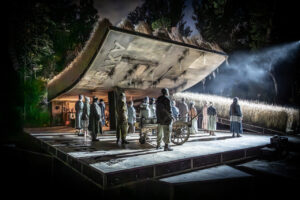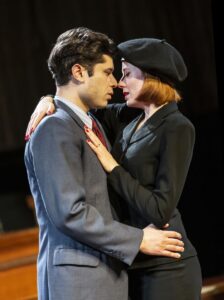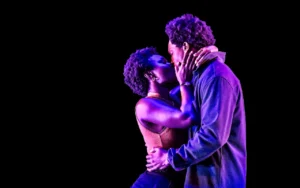Revival brings fresh life to classic musical
★★★★★

Fiddler On The Roof opened on Broadway in 1964, and became the first Broadway musical to pass 3000 performances. Since then there have been tens of thousands of productions: there are said to be 500 amateur productions a year in the USA alone. Proof, if needed, that this story of a small Jewish Community in Russia at the beginning of the twentieth century is an audience favourite, all over the world and across all races and faiths. But why does it touch so many hearts? And what is so special about this latest iteration at the Regent’s Park Open Air Theatre?
Fiddler On The Roof is built around the story of a milkman called Tevye and his conflicts with his daughters over who they should marry. If you haven’t seen Fiddler, or maybe even if you have, you might have the impression that this is all it’s about- a comedy in which Tevye talks to the audience, talks to God and even talks to the violin player about his dilemmas. The idea that it is a light-hearted musical has been reinforced by the cheeriness of the most famous Tevye, Chaim Topol, and the way all the best tunes are loaded in the first half.
We move through Tradition, Matchmaker and If I Were A Rich Man, almost while people are still taking their seats; Sunrise, Sunset follows rapidly, then The Dream which is performed hilariously in this production by all the cast dressed in white acting out Tevye’s apparent nightmare, and, at the climax of act one, the great Bottle Dance, based on Jerome Robbins’ original idea but in this production excitingly choreographed by Julia Cheng, best known until now for her work on the current hit production of Cabaret. All these most familiar moments are gone by the time you claim your interval drink. Which is not to say there aren’t some good numbers in the second act.
I don’t want to talk too much about the second half, in case you haven’t seen Fiddler, but it becomes much clearer that what the first act was setting us up for is the need to compromise our traditions as the world changes, wherever we live, whatever the time, and whatever our own age. And that this will help us face adversity, and not give in to despair. And while this is a positive message in this sometimes depressing world, it comes against a dark backdrop of a small impoverished Russian Jewish Community in 1905, living in relative poverty and threatened by antisemitism. That it still packs a punch today is a credit to the writer of the book Joseph Stein, the lyricist Sheldon Harnick and of course composer Jerry Bock who combined a traditional east European sound with modern music to make unforgettable show tunes.
I was a bit worried when I realised the director was Jordan Fein who was responsible for the downbeat version of Oklahoma! at the Young Vic. I do realise there is a dark undercurrent in Oklahoma! but I felt his gloomy treatment sucked all the joy out of the musical. But here, his ability to see the dark side of a musical is tempered by a lightness of touch, and the heavier theme is handled with sobriety rather than despair. He doesn’t labour the destruction of the community nor the modern parallels, any more than the musical itself does, but he doesn’t skate over them either, as previous productions have tended to do. You could say he has succeeded in balancing the traditional view of Fiddler with a modern sensibility.

Tom Scutt’s design is extraordinary. The costumes feel authentic, all loose simple clothes, that look handmade. The irony is not lost that The Open Air Theatre is the only major London theatre without a roof, but he has created a roof across the stage that looks like a wheat field, symbolising the way the community live off the land. It acts as the village’s protection, yet seems ready to crush them like a Venus Flytrap. The roof dominates but never distracts and it’s high up on that roof that the fiddler is first seen and heard. Raphael Papo is the talented violinist.
Adam Dannheisser banishes all thoughts of Topol
The choice of Adam Dannheisser to play Tevye is inspired. He has a great ability to convey his attempts to reconcile the previous way of matchmaking and the new way of marrying for love. His commanding physical stature helps him seem like an authoritative father figure, but this is accompanied by a world weariness, an uncertainty and a benign quality, expressed through his gentle eyes and gestures. Strong on the outside, soft on the inside, he articulates the inner conflict he feels in trying to reconcile tradition and the modern world. It’s an eternal conflict that audiences identify with.
It seems invidious to pick out other members of the universally excellent cast but I have to bring attention to Lara Pulver as Golde, who provides a strong willed wife for Tevye and has an superb singing voice, best illustrated in the bittersweet duet Do You Love Me?
All the daughters sing and act beautifully. The oldest daughter Tzeitel is played by Liv Andrusier with chutzpah. Dan Wolff is a suitably shy and awkward as her choice of husband Motel. Daniel Krikler is the passionate radical Perchik who wants to marry another strong-minded daughter Hodel, played by Georgia Bruce. Hannah Bristow is the bookish daughter Chava who falls in love with Fyedka, played by George Milne. Comedy is provided by Beverley Klein as the matchmaker Yente, and Michael S Siegel as the miserable butcher Lazar Wolf.
It’s a production that perfectly balances the humorous and the serious.
Fiddler On The Roof was at the Regent’s Park Open Air Theatre until 28 September 2024. It transferred to the Barbican
Paul paid for his own ticket
Here is the link to Paul’s roundup of other critics’ reviews of both the Open Air and Barbican versions
Click here to watch this review on the YouTube channel Theatre Reviews With Paul Seven









